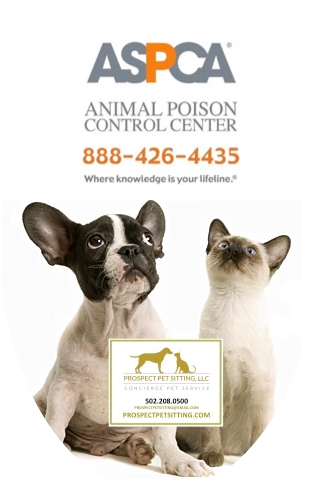
In my last story, “13 Things That Could Poison Your Pet,” I pointed out some of the common household items that are toxic to pets. Although I mentioned a lot of accidental poisoning symptoms, the advice regarding what to do was more general. So, today I am providing some additional information on how to deal with a pet poisoning emergency. These tips were compiled by the ASPCA Animal Poison Control Center (APCC) in response to the nearly 180,000 cases of pets potentially exposed to toxic substances per year.
1. Be Ready
Make sure you have the phone numbers for your veterinarian, the closest emergency veterinary hospital and for a pet poison center saved in your phone. The numbers for the APCC and Pet Poison Hotline are 888-426-4435 and 800-213-6680 respectively. You may be able to provide initial life-saving treatment at home under their guidance, especially if you have a pet first aid kit on hand that is easily accessible.
2. Keep Your Cool
Remaining calm and not panicking when confronted with an emergency involving a furry family member are challenging. Maintaining your composure, however, is truly important in order to insure your pet receives the medical care needed. Staying calm will enable you to better provide first aid in addition to information critical to the professionals treating your pet.
3. Evaluate Your Pet’s Condition
Making a clear assessment of your pet’s condition is vitally important. If your pet is behaving abnormally, bleeding, having difficulty breathing, having convulsions, having seizures or unresponsive, call your vet or the nearest emergency animal hospital and alert them you are on your way.
4. Be Prepared to Answer Questions
Bringing the toxic substance you know or suspect your pet ingested is ideal. Taking some of the vomitus is also advised. If not, write down the exact name of the product or medication. Write down the strength of the drug (normally in milligrams), the concentration of active ingredients in herbicides or pesticides, the EPA registration number and any other information that might aid the veterinarian treating your furry child. Be prepared to discuss when the poisoning occurred, if you caught your pet in the act of ingesting the substance and what they vomited, e.g., the poison, the packaging, etc.
5. Be Proactive
Don’t wait for symptoms to manifest before seeking aid if you know or suspect your beloved pet has ingested a poison as time is of the essence. The more quickly you treat your companion animal either at home under the guidance of a vet or pet poison hotline or at a veterinarian, the greater the chances of survival and recovery.
This article was adapted from a story by Dr. Karen Becker of Mercola Healthy Pets featured on CapeCod.com titled “5 Quick Tips If Your Pet Becomes Poisoned.”
